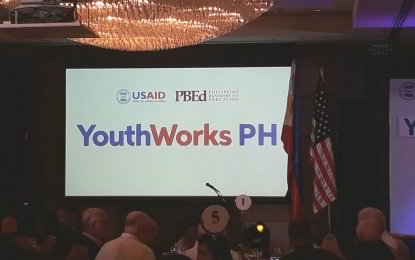
MANILA — The Philippines is deemed as a young nation with vast potentials by other countries because half of its population consists of young people under 30 years old.
Needless to say, such young human resources are creating more challenges than opportunities for the country.
According to Philippine Business for Education (PBEd) Chairman Ramon del Rosario, one of the many reasons for this is the high unemployment rate among young people, which can be corrected through an educational system that is aligned with employment.
Armed with this vision, PBEd, together with the United States Agency for International Development (USAID), launched YouthWorksPH, a work development program that aims to help the youth gain work experience and be empowered to drive democracy, economic growth and transformation of the country.
The program
In an interview with the Philippine News Agency (PNA), PBEd Executive Director Love Basillote said YouthWorks is a five-year training program, where industries commit to create at least 1,000 work-based training positions per year for out-of-school youth (OSY).
Basillote explained that the program is open to OSYs who are not employed, between 18 and 24 years of old and those who have completed Grade 10.
“It doesn’t matter if they’ve graduated from a public or private school. We will recruit trainees recommended by partner non-government organizations and relevant government agencies. But the partner companies will decide on how many trainees they’re willing to host,” she said.
The year-long training will be divided into two parts: the first month is allotted for intensive life skills training and the remaining 11 months will be spent in the companies and schools the OSYs will be deployed in, trained and monitored.
“Say, for example, in the construction industry, for a month they’ll be given life skills training. The next month, 80 percent of it will be spent at the construction site and then the 20 percent in the school where they’re enrolled. It’s like a blending of two worlds where you work and learn relevant skills at the same time to make you employable in the future,” she said.
The trainees will not be graded but they will be evaluated for certification.
Basillote explained that through evaluation, the partner companies and schools will decide if the students are fit for the industry or not.
The partner companies are “encouraged but not obliged to absorb the trainees.”
“Even if they aren’t absorbed by the host company, it is a win-win situation for the trainees because they will have a certification and the opportunity to earn while being trained,” she said.
“Each trainee will receive up to PHP7,500 monthly allowance to be determined regionally. They’re free to use it however they want because they’ve worked for it since it is a work-based training. It’s money they have earned from working and learning at the same time,” she added.
To keep the trainees from dropping out after receiving their monthly allowances for a few months, Basillote told PNA that they have included values formation programs in the life skills training during the first month of the program, in a bid to engage trainees in becoming a partner for change for the country and “not just think of earning money.”
The project is currently in the planning stage and is set to be rolled out on the third or fourth quarter this year in seven major areas nationwide — Cagayan de Oro, Cebu, Iloilo, Davao, General Santos, National Capital Region, and Zamboanga.
PBEd said it has yet to draft its final list of partner schools but APEC schools are on the top of its record.
“The project is five years. Hopefully, if we do a good job, this is just the beginning. We’re just modeling and demonstrating what can be done. The timeframe is partly because of the fund but we want to see first if the model really works since it’s a pilot project,” she said.
Curbing unemployment
Del Rosario said many companies in the country still have difficulty finding qualified human resources despite the fact that more than 2.3 million Filipinos are currently unemployed.
Meanwhile, US Embassy Deputy Chief of Mission Michael Klecheski noted that youth unemployment rate remains very high despite the country’s impressive economic growth.
“Many graduates report difficulty in finding jobs because their education doesn’t match the employer’s needs and many young people don’t have a life mentor who will help them gain confidence,” he said.
Considering such scenario, Klecheski and del Rosario have come up with YouthWorks PH to engage the government and private sectors in delivering “education that can deliver shared prosperity.”
“YouthWorks PH commits to equip the Filipino youth with appropriate skills in communication, critical thinking and decision-making skills so they can strengthen their lives and their communities and contribute to the economic growth and development of the Philippines.” Klecheski said.